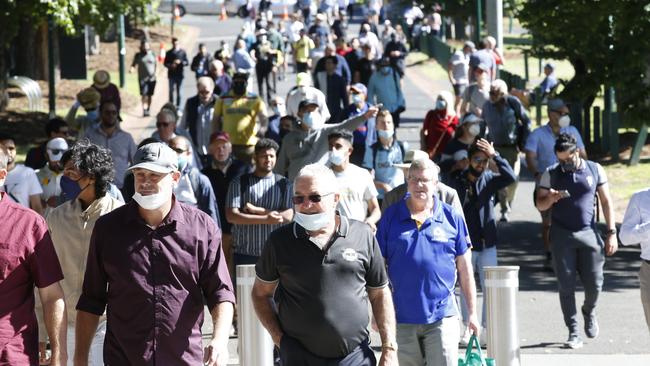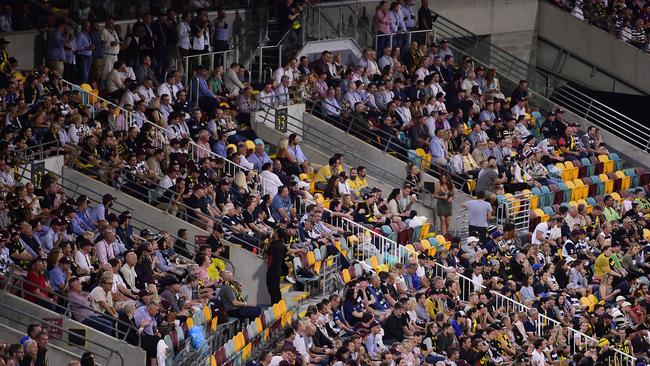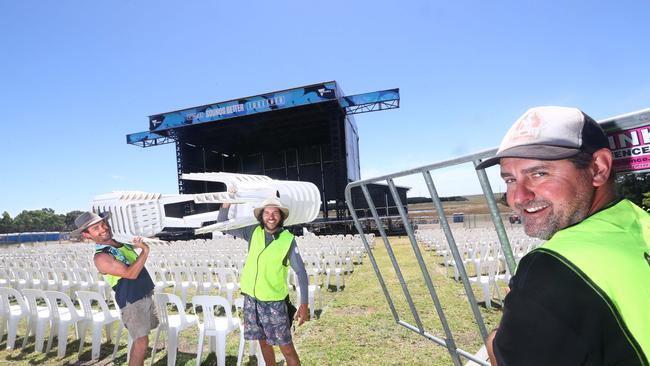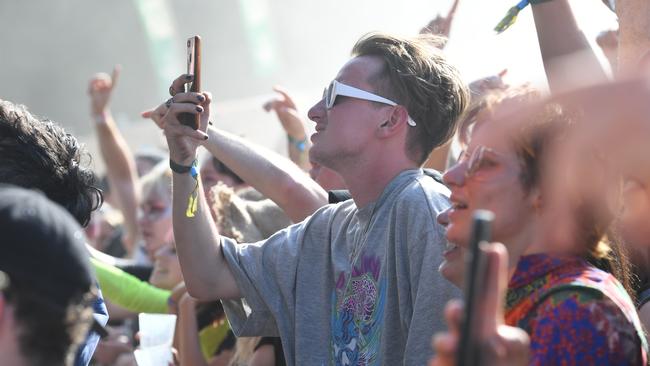Cameron Adams: If sporting crowds can return, why can’t concerts?
As Melbourne gears up to host crowds for an Australian Open like no other, how are other outdoor events like music festivals so far behind?

News
Don't miss out on the headlines from News. Followed categories will be added to My News.
There’s a meme doing the rounds this week. The top half shows an audience at the Gabba standing, cheering and displaying minimal social distancing. Basically behaving like it’s 2019 in a photo taken last year.
Compare that to a photo of the COVID-safe set-up for music concerts — little pods, which frankly look like tiny cattle pens, where six people who must know each other can sit (not stand) to watch a show, separated from pesky strangers.
The music industry has long felt the sport industry gets preferential treatment — the pandemic has proven it.
The AFL Grand Final could welcome 30,000 fans last year, while at the same time in the same state music events were running at just 1500 punters with restrictions on volume, dancing and how close people could stand to each other.
The State of Origin in Brisbane had 52,000 fans last year in the same week music festivals in Queensland were capped at 2000 punters.
It opens up the usual debate — there’s a whole extra layer of income attached to sporting events, from gambling to TV rights. Aside from betting on the Hottest 100, the bookies don’t make much out of the music world.

No one is saying sport shouldn’t be happening — it suits everyone to get everything back to normal as soon as possible — but how are we still seemingly so far behind sports with capacities for indoor and outdoor music events like festivals?
We’re told concerts are problematic as singing can spread particles (in Sydney singers like Jimmy Barnes have to perform behind a line drawn on the stage to keep their distance from the audience, and punters can’t sing along in their seats) and festivals are hard to control social distancing and human interaction at, yet crowds of strangers can shout abuse at umpires and belt out sporting chants.
As the Herald Sun’s Nui Te Koha noted, imagine if it were musicians who’d jetted in for a music festival, who had COVID-19 and were whingeing about being in quarantine, not tennis players. That music event would have been shut down in a heartbeat.
There is movement at the station. The Victorian government is supporting the Sounds Better Together series of concerts that start today and will see acts from Tones and I to Jimmy Barnes playing at venues across the state, with cut-price tickets.
However, COVID-safe shows means venue capacities are a fraction of what they’d usually be — better than nothing but still cutting into ticket sales — and the Australian music industry relies on live performance and, after 2020, maximum ticket sales to survive.

While we hoped in 2020 that maybe commercial radio might step up and support more Australian music, considering those royalties would be crucial considering all other income had gone, only seven Australian songs made the Top 40 most played on our radio stations last year — and the highest-ranked artist was multi-millionaire expat Sia.
Just as grim was ARIA’s Top 50 singles of 2020 — just five Australian songs made the cut — two by Tones and I, plus The Rubens, Sam Fischer and Flume with Vera Blue.
Triple J and community radio support Australian artists, helping acts like Lime Cordiale, the DMAs, the Teskey Brothers and Dune Rats to score successful albums, but it’s difficult to make any money from streaming services like Spotify unless you’re at a Taylor Swift or Ed Sheeran level.
The live music industry supports a raft of others. As well as the musicians, promoters, publicists and crew there’s venue staff, catering staff, those who make the merchandise, hotels, transports. It’s a whole ecosystem that’s been put on hold. And when JobKeeper is cut in March, they’ll be in an even worse position if we’re still in this limboland.
We’ve seen a number of tours put on sale for this year in the blind hope they can happen (it’s a day by day proposition at this stage for artists and promoters) or shows postponed from last year.

This week Peter Noble, who runs Byron Bay event Bluesfest (which has gone all Australian for 2021) released an open letter asking punters to hold onto their tickets, where possible, when shows are rescheduled.
Noble said each refunded ticket sees the promoter cop a service charge from the ticketing agency, which can be up to $8.
“Facing up to two years of no shows,” Noble said, ‘this isn’t sustainable for our industry and will result in less shows.”
This week Tourism, Sport and Major Events Minister Martin Pakula said he hoped Victoria will see music events with audiences similar to the size of those at sporting events this year.
“We have a process for assessing crowd sizes at each and every event,” Pakula told the Herald Sun. “As we keep moving through the year, as the vaccine rolls out and we continue to keep COVID transmission out of the community that will give the public health team more confidence and hopefully larger gigs will follow.”
For those waiting patiently to rock, at large events, not standing in cattle pens, we salute you.
Cameron Adams is the Herald Sun’s music writer


